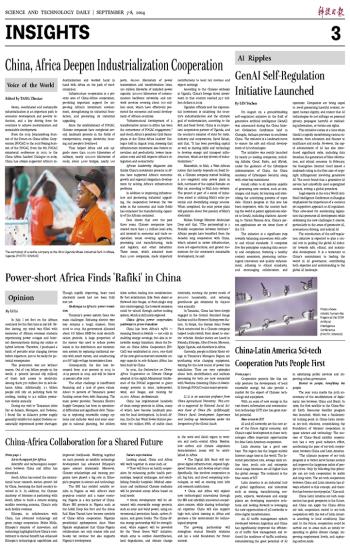
 |
| Photo shows robotic human-like fingers at the 2024 Artificial Intelligence Conference. (PHOTO: XINHUA) |
On August 29, a groundbreaking self-regulation initiative in the field of generative artificial intelligence (GenAI) was announced during the China Internet Civilization Conference held in Chengdu, Sichuan province in southwest China. The initiative is a landmark move to ensure the safe and ethical development of AI technologies.
The initiative was jointly launched by nearly 50 leading companies, including Alibaba Cloud, Baidu, and iFlytek, under the guidance of the Cyberspace Administration of China, the China Academy of Cyberspace Security, along with other key institutions.
GenAI refers to AI systems capable of generating new content, such as text, images, and music, by learning and mimicking the underlying patterns of input data. China's progress in this area has been impressive, with the country leading the world in patent applications related to GenAI, including chatbots. According to United Nations data, China's patent applications are six times those of the U.S.
The initiative is a significant step towards balancing innovation with safety and ethical standards. It comprises five key principles: ensuring data security and compliance, fostering a healthy content ecosystem, promoting technological innovation and quality enhancement, adhering to ethical standards, and encouraging collaboration and openness. Companies are being urged to avoid generating harmful content, respect human dignity, and ensure that AI technologies do not infringe on personal privacy, propagate harmful or misleading information, or violate any rights.
This initiative comes at a time when GenAI is rapidly transforming various industries, from education and finance to healthcare and media. However, the rapid advancement of AI has also introduced significant risks, including data breaches, the generation of false information, and ethical concerns. In February, the Guangzhou Internet Court issued a landmark ruling in the first case of copyright infringement involving generative AI. The court found that a generative AI service had unlawfully used copyrighted content, setting a global precedent.
Legal experts at the 2024 World Artificial Intelligence Conference in Shanghai emphasized the importance of a cautious yet supportive approach to AI regulation. They advocated for accelerating legislation that promotes AI development while addressing the new challenges it creates, particularly in the areas of generative AI, autonomous driving, and judicial AI.
The introduction of the self-regulation initiative is expected to play a crucial role in guiding the global AI industry towards safe, ethical, and sustainable development. It is a testament to China's commitment to leading the world in AI governance, contributing both expertise and understanding to the global AI landscape.


 Next
Next




